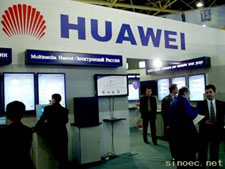Top telecom players eye global markets
By Chen Zhiming (China Daily)Updated: 2007-05-17 10:15
 Riding the wave of globalization, China's
telecommunications equipment manufacturers are enhancing their performance to
make strides in the international market.
Riding the wave of globalization, China's
telecommunications equipment manufacturers are enhancing their performance to
make strides in the international market.
Brand names such as Huawei Technologies, ZTE, China Putian and Alcatel Shanghai Bell (ASB) have all benefited from international strategies in the past few years.
"We have registered high growth in the overseas market in the past four years," said Zhou Tao, executive vice-president of ASB, a joint venture between Alcatel and the former Shanghai Bell.
Company data shows overseas sales increased five times in the past four years. The international market accounted for almost 50 percent of the company's total last year.
"We've made substantial growth by changing from importing foreign technologies in the past to exporting technologies now," he said.
Zhao attributed ASB's sustainable growth to its unique position in the domestic and international market. Established in 2002, ASB is the first foreign-invested company limited by shares in China's telecommunications industry. Alcatel owns 50 percent plus a share in ASB.
"The convergence of Alcatel and Lucent has added great vitality to our international performance," Zhou said.
Alcatel completed a merger with Lucent on November 30. Alcatel-Lucent coves 130 countries and has annual revenue of 18.25 billion euro.
"We could take advantage of Alcatel-Lucent's brand, human resources and management experience to further strengthen our presence in the international market," he said.
ASB hopes to continue developing its business in Africa, South Asia and Latin America, and the company hopes to strengthen its performance in developed countries via its strategic partners.
ASB's global expansion is just a glimpse of equipment providers' overseas expansion.
Huawei overseas expansion is another good example. "The international market has become the major source of sales for our company," Huawei said a statement. It said that in the first three quarters of last year, 68 percent of the company's sales were from overseas markets.
Li Jinge, senior vice-president of Huawei was quoted by Sina.com early this month as saying the company is expecting contract sales to reach $15 billion, up 30 percent from the previous year. The contractual value reached $11 billion last year.
In the African market, company sales increased $2.08 billion last year. "We expect to record a growth rate of 70 to 80 percent from 2006," Li said.
By targeting the international market, Huawei has established eight regional headquarters and more than 100 branches overseas serving more than 1 billion customers.
"We expect to continue to record stable growth in the overseas market in the coming years," Huawei Technologies said in a statement to China Daily.
According to Huawei, emphasis on research and development and localization have become two of the major factors for its international growth.
The company has long put no less than 10 percent of its sales into R&D. It has established 12 research and development institutes worldwide.
"With the further opening of the telecom market, domestic telecom-related enterprises are all facing both opportunities and challenges of going international," said Zeng Jianqiu, a professor with Beijing University of Posts and Telecommunications.
(For more biz stories, please visit Industry Updates)
| ||